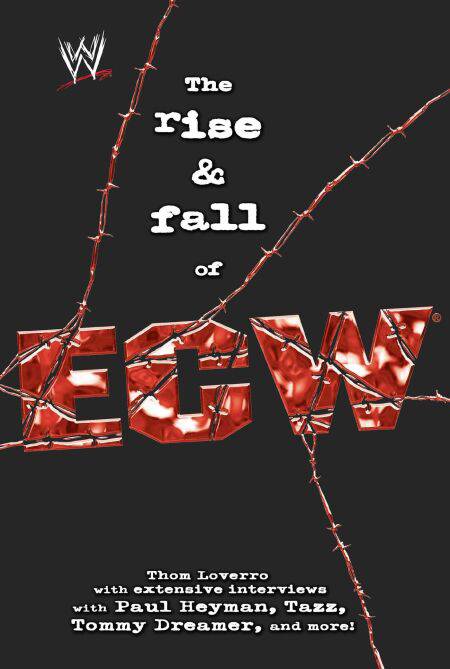
Je cadeautjes zeker op tijd in huis hebben voor de feestdagen? Kom langs in onze winkels en vind het perfecte geschenk!
- Afhalen na 1 uur in een winkel met voorraad
- Gratis thuislevering in België vanaf € 30
- Ruim aanbod met 7 miljoen producten
Je cadeautjes zeker op tijd in huis hebben voor de feestdagen? Kom langs in onze winkels en vind het perfecte geschenk!
- Afhalen na 1 uur in een winkel met voorraad
- Gratis thuislevering in België vanaf € 30
- Ruim aanbod met 7 miljoen producten
Zoeken
€ 15,65
+ 15 punten
Uitvoering
Omschrijving
Independent wrestling promotions were once the norm all across the country. However, with the rise of World Wrestling Entertainment and the creation of World Championship Wrestling -- out of three Southern promotions -- the possibility of an independent succeeding grew fainter and fainter. As the nineties began, independents were looking for creative ways to survive. In the East, several banded together to share cost and talent; they were known as Eastern Championship Wrestling. Based out of a warehouse in Philadelphia that stored parade floats and hosted bingo, this promotion seemed doomed to be just one more ninety-day wonder. When they hired a brash New Yorker, Paul Heyman, he warned Eastern Championship Wrestling that the job was just temporary. He would come in, shake up a lot of the wrestlers, and then leave. But what Heyman did redefined professional wrestling in the nineties. What he created was a company that dared to push the boundaries of sports entertainment. What he created became Extreme Championship Wrestling.
As the person responsible for booking -- who was going to wrestle and who was going to win -- Heyman dared to break with tradition. Rather than relying on local talent and down-and-out veterans to draw in crowds, he created new characters and story lines that would appeal to the core wrestling fans: eighteen- to twenty-four- year-old men. Paul also realized that to persuade them to come, you had to get their interest and keep it. You had to offer the fans more than just the match. ECW became known for the interview, the shoot. Heyman got to know each wrestler's style, and in their interviews he would encourage them to speak from their hearts. When it came to the matches, ECW broke even farther from the mainstream. Tables, ladders, chairs, barbed wire, and even frying pans were used with abandon. Wrestlers not wanting to be topped put their bodies on the line, taking ever greater risks, daring to jump, leap, and fall from places never tried before. ECW matches became the stuff of legend.
Word spread as savvy wrestling fans began talking about the promotion and exchanging tapes. To keep the buzz building, wrestlers used the age-old trick of taunting the fans, and ECW fans responded in kind. By including the fans in the shows, ECW attracted a rabid, cult-like following that is still going strong today.
For nearly a decade, ECW redefined professional wrestling with a reckless, brutal, death-defying, and often bloody style that became synonymous with "hardcore." Through extensive interviews with former ECW talent and management -- Paul Heyman, Mick Foley, Tazz, Tommy Dreamer, Rob Van Dam, and many more -- The Rise & Fall of ECW reveals what made this upstart company from Philadelphia great -- and what ultimately led to its demise.
As the person responsible for booking -- who was going to wrestle and who was going to win -- Heyman dared to break with tradition. Rather than relying on local talent and down-and-out veterans to draw in crowds, he created new characters and story lines that would appeal to the core wrestling fans: eighteen- to twenty-four- year-old men. Paul also realized that to persuade them to come, you had to get their interest and keep it. You had to offer the fans more than just the match. ECW became known for the interview, the shoot. Heyman got to know each wrestler's style, and in their interviews he would encourage them to speak from their hearts. When it came to the matches, ECW broke even farther from the mainstream. Tables, ladders, chairs, barbed wire, and even frying pans were used with abandon. Wrestlers not wanting to be topped put their bodies on the line, taking ever greater risks, daring to jump, leap, and fall from places never tried before. ECW matches became the stuff of legend.
Word spread as savvy wrestling fans began talking about the promotion and exchanging tapes. To keep the buzz building, wrestlers used the age-old trick of taunting the fans, and ECW fans responded in kind. By including the fans in the shows, ECW attracted a rabid, cult-like following that is still going strong today.
For nearly a decade, ECW redefined professional wrestling with a reckless, brutal, death-defying, and often bloody style that became synonymous with "hardcore." Through extensive interviews with former ECW talent and management -- Paul Heyman, Mick Foley, Tazz, Tommy Dreamer, Rob Van Dam, and many more -- The Rise & Fall of ECW reveals what made this upstart company from Philadelphia great -- and what ultimately led to its demise.
Specificaties
Betrokkenen
- Auteur(s):
- Uitgeverij:
Inhoud
- Aantal bladzijden:
- 272
- Taal:
- Engels
- Reeks:
Eigenschappen
- Productcode (EAN):
- 9781416561569
- Verschijningsdatum:
- 21/05/2007
- Uitvoering:
- E-book
- Beveiligd met:
- Adobe DRM
- Formaat:
- ePub

Alleen bij Standaard Boekhandel
+ 15 punten op je klantenkaart van Standaard Boekhandel
Beoordelingen
We publiceren alleen reviews die voldoen aan de voorwaarden voor reviews. Bekijk onze voorwaarden voor reviews.









